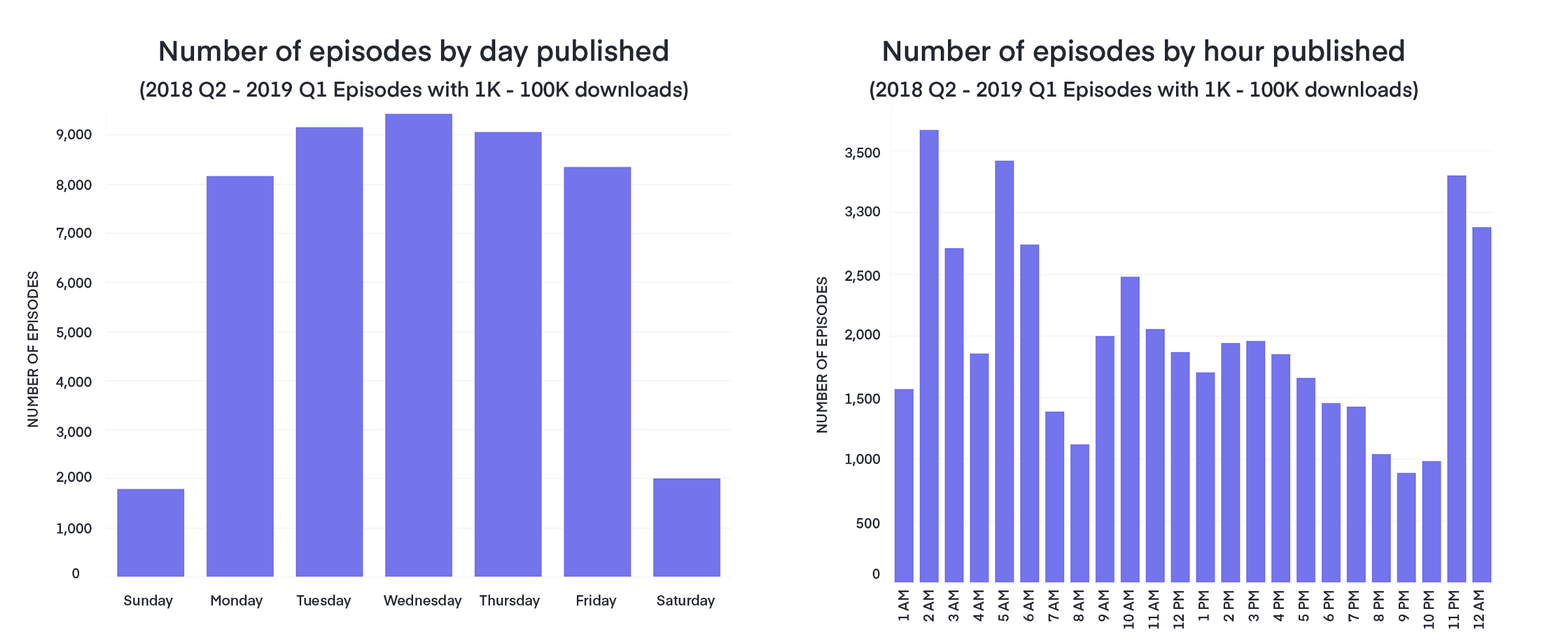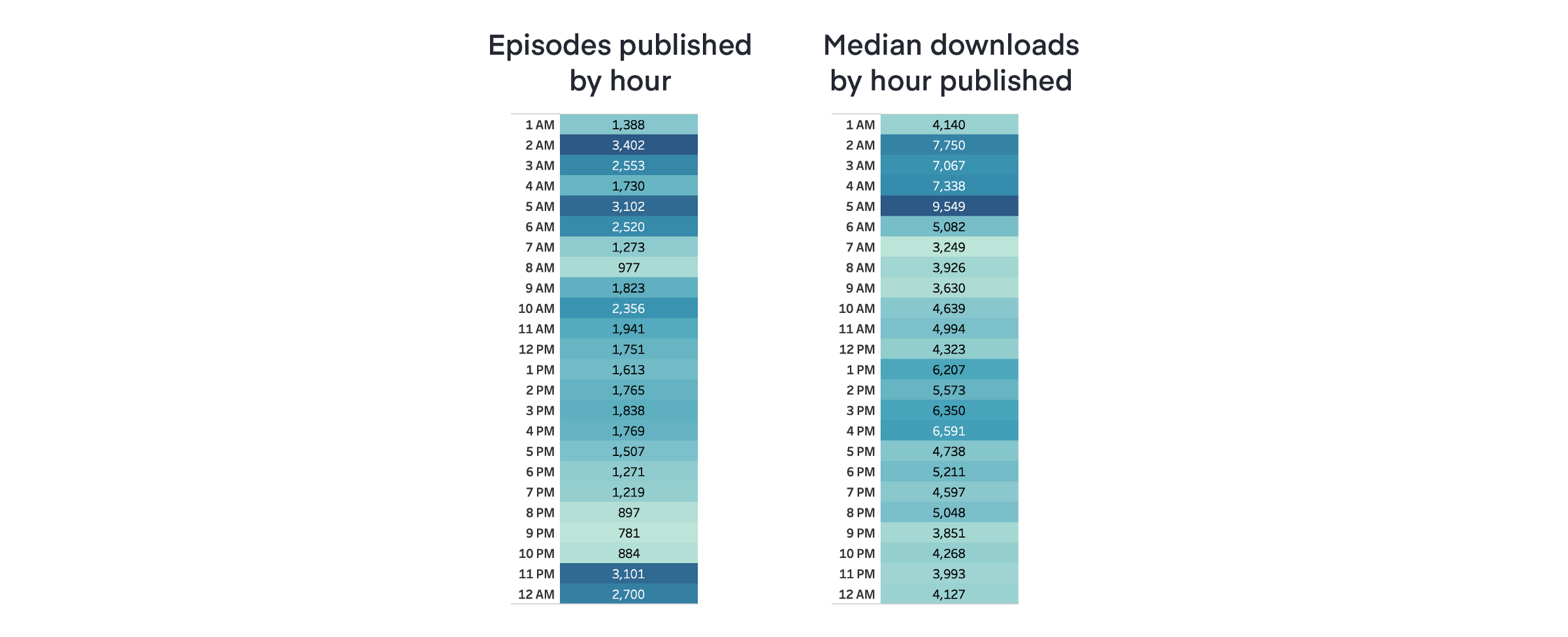The best day to release a podcast according to current industry recommendation is to release your new podcast episode on Tuesdays, Wednesdays, or Thursdays during the early mornings between 2 am and 5 am Eastern Time. But why?
Related: Start a Podcast People Will Listen To
Contents
The Best Day to Release a Podcast (and The Best Times)
Research from Megaphone shows that most episodes are published Tuesday and Thursday between 2 AM and 6 AM, with 5 AM seeing the highest number of downloads. This makes sense when you consider that people usually commute to work or school just after those hours. So if you’re looking to maximize your audience, it’s worth considering releasing your episodes on one of those days.
Going into more detail regarding the hours, by looking just at the times episodes are released independently of the day we can see some trends:
An episode seems to gain a competitive edge if released just before the morning or afternoon commutes. Which seems to indicate that new episodes are presented to listeners at the top of their feeds and therefore there is a higher chance that they’ll pick to listen to it.
If you wanted one takeaway from this research was that the best day to release a podcast is Tuesday at 5 am if you aim to prioritize maximum number of listens, or Thursday if you want to prioritize maximum number of downloads.
But you should take all this with a grain of salt.
Because this study was conducted in 2019, and has rained quite a bit since then. And it was done on then Megaphone’s data, which is may not be representative of the whole space.
So instead, the answer to this question depends on many factors, including your podcast’s content, audience, and schedule. However, a few general guidelines can help you choose the best day and time to release a new episode.
First, consider the topic of your podcast and whether it would be time to release new episodes on certain days or during certain times of the year. For example, if your podcast is about current events, you may want to release new episodes on Mondays so that your audience can stay up-to-date on the latest news. Alternatively, if your podcast is about a seasonal topic, you may want to release new episodes before the relevant holiday.
Second, consider when your audience will most likely be available to listen to your podcast. For example, if you’re targeting working professionals, you may want to release new episodes right before their commute or in the evening. Wednesday may be the best day to publish a new podcast episode, but it’s not the only day that sees high numbers of downloads.
Finally, just know that you can always adapt to your audience by looking at the analytics, so start with whatever you think will work best for your audience but don’t be afraid to experiment and see when they download and consume your episodes.
Publishing a Podcast at Midnight: A Good Idea?
According to Megaphone, posts from 2 AM to 6 AM have much higher download rates than those that go live at midnight. So, if you want people to hear your voice, you need to give them a reason to stay up late.
Why is a Regular Podcast Schedule Important?
It’s no secret that the key to a successful podcast is good content. But what’s often overlooked is the importance of scheduling. Releasing new episodes regularly helps to build an audience and keep them coming back for more. Also, it shows that you are committed to the show and are serious about delivering quality content.
By releasing episodes on a regular schedule, podcasts make it easy for listeners to keep up with their favorite shows. Of course, scheduling a podcast is not always easy. It requires careful planning and coordination, especially if the show has multiple hosts or guests. But the effort is worth it, as a well-scheduled podcast will surely be a hit with listeners.
Of course, there will be times when real life gets in the way, and you can’t stick to your schedule. But if you can, it will make a big difference in the success of your podcast.
Related: 12 Cool Tricks to Grow Your Number of Podcast Listeners
How Frequently Should You Release a Podcast?
Podcasters are grappling with a tricky question- how often should you release episodes of your show? There is no easy answer, as the frequency of releases will depend on various factors, including the length of your episodes, the amount of time you have to devote to podcasting, and the availability of guests. However, there are a few general guidelines that you can follow. It is probably best to release new episodes weekly if you are starting. This will give you time to get comfortable with the recording and editing process, and it will also give you a chance to build up a backlog of episodes in case you ever need to take a break.
Once you have found your rhythm, you can experiment with different release schedules. Some podcasters opt for a twice-weekly format, while others release new episodes daily. Ultimately, the decision is up to you. Remember that consistency is vital- so whatever schedule you choose, make sure you stick to it.
Related: How Many Episodes Should a Podcast Season Have?
What is Podfade and How to Prevent it?
As we stated before, consistency is critical when it comes to podcasts. Unfortunately, many podcasters struggle to maintain a consistent release schedule, which can often lead to “podfade.” Podfade is when a podcast gradually or suddenly loses momentum and stops releasing new episodes. This can severely stunt the growth of a podcast and, in some cases, kill it completely. If you’re intentional about ending your podcast (e.g., after five episodes), that’s one thing. But if you stop creating content without a good reason, you’ll lose the trust of your audience, and they’ll go elsewhere.
So how can you prevent podfade?
Set healthy expectations.
First, set healthy expectations for yourself. Don’t bite off more than you can chew and be realistic about how often you can release new episodes.
Have a clear plan.
Second, have a clear plan for each episode. What topics will you cover? Who will you interview? Having a clear plan will make it easier to stay on track (and avoid those dreaded last-minute scrambling sessions).
Make some buffer time.
Third, build in some flexible buffer time. Life happens, and things will come up that prevent you from recording or editing an episode on time. Making some buffer time will reduce the chances of missing a deadline (and dealing with the consequent guilt).
Try batching.
Fourth, the use of this strategy that can be helpful is known as “batching.” Batching is simply the process of grouping similar tasks together so that you can complete them more efficiently. For example, if you’re planning to record a season of episodes, you might set aside a block of time specifically for brainstorming ideas, conducting interviews, and writing titles and descriptions. By batching these tasks together, you can minimize distractions and make more progress in less time. So next time you’re overwhelmed by your to-do list, try batching similar tasks together and see how it can help you get more done in less time.
Take a break.
Fifth, we all know the feeling of podfading. You’re sick of recording, editing, and promoting your show. You want to take a break. But you can’t because you don’t want to lose your audience. Or maybe you do take a break, but you feel guilty the whole time. I’m here to tell you that taking a break from your podcast is okay. It might even be good for you. Podfading is often caused by burnout, and the best way to avoid burnout is to rest. That doesn’t mean you have to stop podcasting altogether. There are plenty of ways to take a break without completely shutting down your show.
For example, you could break your show into seasons, with several weeks or months between each season. This way, you can take a break when you need to without make your listeners wait too long for new content. Alternatively, you could batch-record episodes in advance, so fresh content is always available, even when taking a break. Whatever method you choose, communicate clearly with your audience, and go easy on yourself. Everybody needs a day off sometimes. So don’t feel guilty about taking a break from your podcast. It might even be the best thing for it in the long run.
Don’t hesitate to ask for help.
Finally, don’t be afraid to ask for help. There are plenty of people out there who are willing to lend a hand (or an ear) if needed. So if you’re struggling to keep up with your podcasting duties, reach out for help. It could make all the difference in avoiding podfade.
Planning a Podcast Launch
So you’ve decided to launch a podcast. Congratulations! You’re about to embark on a journey that will teach you a lot about yourself, your microphone skills, and the limits of human patience. But before you hit record, planning your launch is another critical step.
Now, some people might say that planning is overrated. They’ll tell you that the best podcasts are the ones that happen organically and without any forethought. But those people have never had to listen to an episode of a podcast that meanders aimlessly for an hour without ever really getting to the point. Planning doesn’t have to be complicated or time-consuming. In fact, with a little careful thought and planning, you can make sure that your podcast launch goes off without a hitch – and that your first episode is worth listening to.
Here are a few things to keep in mind as you plan your launch:
Who is your audience?
The first step in planning your launch is figuring out who you’re trying to reach with your podcast. Defining your target audience will help you determine what content to include in your episodes and help you choose the right platform for promoting your show. For example, if you’re trying to reach new parents, posting about your podcast on parenting forums or in Facebook groups for parents is likely to be more effective than promoting it on Twitter or Instagram.
What kind of content will you include?
Once you know your audience, it’s time to start thinking about what type of content you’ll have in your episodes. Will they be interviews? Discussion-based? Solo shows? Knowing the format of your presentation will help you plan each episode and ensure that each one has a clear purpose and focus.
How often will you release new episodes?
This is one of the most important questions to answer when launching a new podcast. Of course, you don’t want to overwhelm yourself (or your listeners) by releasing new episodes too frequently, but at the same time, releasing them too infrequently will make it challenging to build an audience. A good rule of thumb is to start with two monthly episodes and increase frequency as needed based on listener feedback and engagement levels.
How will you promote your podcast?
Promotion is essential for any successful podcast launch – but it doesn’t have to be complicated or expensive. There are plenty of free (or very inexpensive) ways to promote your podcast, including social media, email marketing, and guest blogging. Plan how you’ll promote each episode before it goes live to ensure each one gets the attention it deserves.
By following these simple tips, you can set yourself up for success as you launch your very own podcast!
Related: PODCAST PROMOTION: The Complete List
What’s the Best Time of Year to Launch a Podcast?
When you’re thinking of what time to launch a podcast, consider your audience. If your podcast focuses on health and fitness, you may want to launch in the New Year, when people make their Resolutions to lose weight and get fit. If you have a spooky true crime show in the works, October would be a great time to launch as it is near Halloween. In order to determine the best possible time for your podcast to launch, do research into when other podcasts launched and the level of success they had after their launch – how many downloads did one podcast of the same subject get after their initial launch in January vs. another one’s launch in June?
Related: How to Find Out the Number of Podcast Listeners a Podcast Has
How to Successfully Launch a Podcast
The key to launching any successful business – let alone a podcast – is to build up excitement and anticipation for your consumers. For a podcast, this is especially important. Once you have a good amount of podcasts under your belt, with good sound quality and interesting content, you’ll want to create a calendar for when these podcasts will be released.
In the months leading up to your podcast’s release, you will want to advertise your new podcast by connecting with other podcasters and asking for them to let their listeners know about your upcoming launch. You may need to spend some money for this, but some podcasters may help you out for free or for future advertising with your show.
You will also want to set up social media accounts and go on forums dealing with the subject of your podcast to inspire people to check out your upcoming podcast and ask them questions about the kinds of content they want to see. Spend some money on social media advertising to drive traffic to your pages and get followers.
Related: Can You Do a Solo Podcast?
How Do You Market a Podcast?

Marketing a podcast involves dedication. You need to stay on top of your social media pages to keep top of mind for the followers of your show. Develop relationships with other podcasters to guest host on their podcasts to drive new listeners to your show. Communicate regularly with your listeners to build a loyal following. Another great way to get your podcast out there is developing merchandise your already loyal followers can wear while out and about. This will get your name out there and inspire others to listen to the podcast, too.
Related: How to Start a Podcast With No Audience: What You Need to Know
How to Launch your Podcast with a Trailer Episode?
In order to make your podcast stand out from the hundreds of thousands of other shows you’ll have to be creative. One way to do this is by starting with a trailer episode.
A trailer episode is a short (usually under 15 minutes) episode that gives listeners a taste of what your podcast will be about. Think of it like a movie trailer – it should be attention-grabbing and leave listeners wanting more. When creating your trailer episode, be sure to include the following:
- An engaging intro – This is your chance to hook listeners in and tell them about your show. Keep it concise, and make sure your energy shines through!
- A preview of upcoming episodes – Give listeners a taste of what’s to come on your show. If you have interviews lined up, this is a great time to let people know who you’ll be talking to.
- A call to action – Tell listeners what you want them to do after listening to the trailer episode (subscribe to your show, leave a review, etc.)
Starting with an intense trailer episode will give your podcast the best chance of success. So go forth and conquer the world of podcasting!
The Ranking Factor in Podcasting
Undoubtedly, being featured on Apple’s New and Noteworthy or Spotify’s Podcast Charts can help your show grow. But many podcasters don’t realize that the ranking factor for these charts is based on engagement, not downloads. In other words, it doesn’t matter how many people download your podcast if they’re not listening. That’s why, if you’re hoping to game the charts, your best bet is to focus on engagement. Create a show that people will enjoy listening to and promote it in places where potential listeners are likely to see it. You could soon find your show climbing the charts with a little effort.
The best strategy to becoming known is looking for excellence. As Tom Webster, Senior VP of Edison Research, says, “Being ‘known’ is out of your control. So, start with being known for something. And have that something be excellence.” In other words, focus on producing high-quality content and promoting it within your niche, and let word-of-mouth do the rest. It may not be the quickest path to success, but it’s undoubtedly the most sustainable — and, ultimately, the most rewarding. So, forget about shortcuts and gimmicks; if you want to build a lasting podcast, Plant a flag for quality.
There’s no shortage of myths surrounding Podcast news and noteworthy. For example, many believe the window of time for getting into New and Noteworthy is a mere eight weeks. However, this has been proven wrong time and time again. Shows much older than eight weeks have been featured on New and Noteworthy. While some novelty may be involved in how they pick shows, it’s clear that the 8-week shelf life is nothing more than a myth. So, if you’re planning on starting a podcast, don’t worry if you miss the 8-week mark. There’s still plenty of time to get into New and Noteworthy.
There’s no magic bullet for getting your podcast into Apple’s New and Noteworthy section. The algorithm is a closely guarded secret, like the recipe for Coca-Cola or the contents of the Vatican archives. But some generally agreed-upon factors can help your chances: subscribers, downloads, ratings, and reviews. In other words, they are making a show that people want to listen to. That’s the best way to get into New and Noteworthy. So, forget about the rankings and focus on making an excellent show. The rest will take care of itself.
Your ranking factor can significantly affect whether or not people discover your podcast. If you’re not ranking well, then it’s likely that fewer people will stumble upon your show. So how do you improve your ranking?
Many factors come into play, but one thing you can control is the keywords you use in your title and description. Make sure you’re using relevant keywords that people are searching for. You can also try to get featured on popular podcasts in your niche. If you can get featured on a show that ranks highly, then that will give your podcast a boost.
So don’t underestimate the importance of ranking well in the iTunes store. It may not be as flashy as having great artwork, but it can make a big difference in whether or not people discover your podcast.
Conclusion
If you’re planning to launch a podcast, congrats! You’re about to embark on a great adventure. But before you do, there are some things you should know about scheduling your show. In this post, we’ve outlined the best day and time to release a new episode, how often you should publish, and what podfade is (and how to avoid it). With this knowledge, you can confidently plan your podcast launch and start climbing the rankings. Have questions or want to share your own experiences? Let me know in the comments below.





